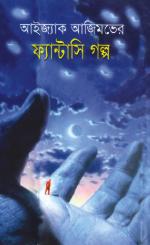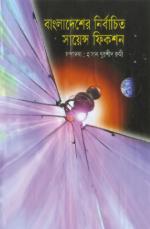| Translating
Imaginations
Ashfaq
Wares Khan
If
publishers in the book capital of Banglabazar need a new
sci-fi story for the Ekushey Book Fair (EBF), a lanky man
with an unusually restless and hyper-active composure is
called upon -- Hasan Khurshid Rumi. To the Bangladeshi science-fiction
scene Rumi is -- the godfather.
Rumi
stands as an invisible giant in the world of science-fiction
in Bangladesh. Invisible, because his indefatigable energy
has been injected in translating over 50 anthologies and
books from sci-fi, fantasy and western genres, and in editing
various Bangla sci-fi anthologies, rather than writing original
stories that have kept him out of the limelight.
Rumi,
along with his translating responsibilities has also carefully
tended to a flock of new-generation translators and local
sci-fi and fantasy writers that is part of the sci-fi explosion
in the country, and as Ahsan Habib, lightly but surely states,
"Takes pressure off Mohammad Zafar Iqbal as the sole
sci-fi representative in the country."
Asked
if he could trace the origin of his sci-fi interests, Rumi
seems to have a readymade answer "My mother gave me
a book called 'Ak Je Chhilo Nengti', a fantasy story written
by Ekhlasuddin Ahmed, that perhaps sparked something of
the fantasy world in me, but when my mother bought me Alexander
Belayev's 'Amphibian Man' it triggered a blast into the
absurd and unreal word of fiction and fantasy."
The
world of the absurd and the drive to express a powerful
imagination is perhaps where most of Rumi's creative work
resides and also helps to explain the link between his sci-fi
and fantasy work and his position as the Associate Executive
Editor of the immensely popular monthly satire magazine
Unmad.
 His
history with the absurd and the imaginary, in this way,
is closely interlinked with Unmad, and an old friend and
mentor Kazi Anwar Hossain. Strangely enough, although Rumi
has written only a handful of original sci-fi stories published
within his edited local anthologies, his only original book
was a pictorial guide to meditative exercise, titled "Sachitra
Yog Byam Shikkha" (Salauddin Boighar, 1982). After
a ten-year hiatus, during which he thrived in various forays
into fantasy, sci-fi and teen literatures, his next book
was the first of his translated anthologies titled "Ora
Eshechhilo" (Sheba, 1992). His
history with the absurd and the imaginary, in this way,
is closely interlinked with Unmad, and an old friend and
mentor Kazi Anwar Hossain. Strangely enough, although Rumi
has written only a handful of original sci-fi stories published
within his edited local anthologies, his only original book
was a pictorial guide to meditative exercise, titled "Sachitra
Yog Byam Shikkha" (Salauddin Boighar, 1982). After
a ten-year hiatus, during which he thrived in various forays
into fantasy, sci-fi and teen literatures, his next book
was the first of his translated anthologies titled "Ora
Eshechhilo" (Sheba, 1992).
"I
collected everything concerned with Sci-Fi, from books and
magazines to comics and movies," says Rumi.
Rumi's
sporadic publications afterwards, followed a parallel path
with the rise of Sci-Fi in Bangladesh owing largely to the
plethora of publications by Md Zafar Iqbal and a wider entrance
to television and the internet. As he increased his number
of translations, he joined Unmad in 1999 and soon after
Rumi and Unmad editor Ahsan Habib brainstormed the birth
of Bangladesh's first Sci-Fi magazine "Moulik".
The magazine gathered a wide following but went defunct
within three years because the new-generation writers and
translators could not follow suit.
However,
Rumi says, new and very promising Sci-Fi fantasy writers
like Anik Khan, Asrar Masud, Sajjad Kabir, Russel Ahmed,
Rabiul Hasan Obhi, Mizanur Rahman Kallol, came of age while
working with the magazine. Although these new writers are
show-cased in recent anthologies of local writers, Rumi
still hopes to bring out a magazine if he receives financial
patrons in the future, but is thankful for the publishers
of his current books.
"Publishers
like Arifur Rahman Nayeem of Oitijjyo, took a headlong dive
into a world of risk when they decided to publish my translations,"
Rumi recalls, but from the hot-cake sales of Sci-Fi these
days, publishers are keen more than ever to pour their money
into Sci-Fi books.
But,
when it comes to his original Sci-Fi work, Rumi says he
hasn't reached a point yet where he has read so much that
his own ideas will start to flow automatically. He adds
that he is so busy with translating and compiling stories
these days that he doesn't get the time to think about writing
original stories.
For
that matter, he blames the rich reservoir of science-fiction
that continues to feed the world, and he assures he has
more to supply Bangladesh. "Asimov's a menace, he's
written 800 books, and I just have to translate them all!"
Continuing in his acerbic tone, he adds "Then there's
that old hag Arthur C Clarke who writes in that hardcore
scientific way, and there's even room to translate Jules
Verne, whose short stories are yet to be done!"
When
asked why Rumi feels obliged to translate all these stories,
he replies "Well, not only is it about the story but
also about science. In a way I am translating to inform
people in interesting ways about science, and in effect,
engage them in learning." However, some doubt the success
of Rumi's ambition of informing and engaging people with
science through sci-fi, in fact, they are downright displeased
with the effect of sci-fi in Bangladesh.
A number
of prominent commentators on science and science fiction
in Bangladesh have recently been inclined to the criticism
that the large readership that follows sci-fi in this country
have come to view even the fictional aspect of that literature
"as" science. And the readership, as the publishers
say and demonstrate, is indeed very, very large!
When
it is quite common to find a single copy of many authors'
books to leave the shelves at the EBF, Rumi's translated
anthologies of Russian science-fiction, and volumes after
volumes of Isaac Asimov and Arthur C Clarke have often been
cleared off the book-shelves by EBF goers.
The
readership, as Rumi explains, largely comprises of students
from both genders that have diligently purchased science-fiction
books since the popularity of the genre spiralled after
Mohammad Zafar Iqbal ventured into the sci-fi space since
the early 1990s.
Rumi
also feels that the Bangali readership had always been interested
in Sci-Fi. Bangla translations of popular Sci-Fi writers
were already in print in Kolkata, but their yields did not
focus specifically on a single writer. Moreover, when Rumi
worked in the editorial board of "Kishor Patrika"
they brought out two special issues on Sci-Fi -- they were
all sold-out and requests flooded in for a second print!
In Rumi's
words "Even the English version of Asimov and Clarke
that pour into Dhaka are sold in a jiffy, that supports
my belief of all these years that names like Asimov and
Clarke had already been embedded into the psyche of the
Bangali sci-fi followers, it was only a matter of making
them more thirsty."
 Some
critics, however, have questions regarding the accessibility
of these stories. Rumi agrees with this. He says that the
quality of some of the translations have deteriorated because
he has had to hire a large number of translators to translate
the huge number of stories that are in his hands. But, he
is careful in pondering these criticisms "They are
fairly new as translators, and the quality suffers in only
a small number of stories, but the majority still attest
to a big group of very solid translators who are sure to
pursue their own ambitions in the sci-fi world." Some
critics, however, have questions regarding the accessibility
of these stories. Rumi agrees with this. He says that the
quality of some of the translations have deteriorated because
he has had to hire a large number of translators to translate
the huge number of stories that are in his hands. But, he
is careful in pondering these criticisms "They are
fairly new as translators, and the quality suffers in only
a small number of stories, but the majority still attest
to a big group of very solid translators who are sure to
pursue their own ambitions in the sci-fi world."
Rumi's
own dedication to this ambition, however, is beyond question.
He suffered from a heart-attack last September from over-work
and stress. "I worked day and night over the translations
of 7 books that came out from EBF, in 2004 and going over
proofs, I even worked on my sick-bed after the attack. My
publishers, and especially my family were very supportive
during that time."
The
family head, with a new-born son, is proud to announce to
the world the progeny is the "Sci-Fi genius of the
future." The first-born daughter and his enduring wife,
has been a great source of encouragement for Rumi. With
shelves that were supposed to be filled with decorations,
almiras that were to be filled with clothes, are all filled
with books, Rumi's wife blurts out tolerantly "He's
made a mess of the house with all his books, CDs and magazines!
Next thing you know, he's probably going to sleep in the
storeroom with all his books instead of on the bed! Every
time I see a book in his hands these days, I get angry."
Nevertheless,
the godfather of Bangladeshi Sci-Fi, who was born on November
2, 1959 in Chittagong to a mother who was obsessed with
reading, sits with his uplifting grin and takes a rare respite
from his restlessness to announce, "I will translate
it all, everything," and returns to his preoccupations
with the absurd world of fantasy.
| 
 His
history with the absurd and the imaginary, in this way,
is closely interlinked with Unmad, and an old friend and
mentor Kazi Anwar Hossain. Strangely enough, although Rumi
has written only a handful of original sci-fi stories published
within his edited local anthologies, his only original book
was a pictorial guide to meditative exercise, titled "Sachitra
Yog Byam Shikkha" (Salauddin Boighar, 1982). After
a ten-year hiatus, during which he thrived in various forays
into fantasy, sci-fi and teen literatures, his next book
was the first of his translated anthologies titled "Ora
Eshechhilo" (Sheba, 1992).
His
history with the absurd and the imaginary, in this way,
is closely interlinked with Unmad, and an old friend and
mentor Kazi Anwar Hossain. Strangely enough, although Rumi
has written only a handful of original sci-fi stories published
within his edited local anthologies, his only original book
was a pictorial guide to meditative exercise, titled "Sachitra
Yog Byam Shikkha" (Salauddin Boighar, 1982). After
a ten-year hiatus, during which he thrived in various forays
into fantasy, sci-fi and teen literatures, his next book
was the first of his translated anthologies titled "Ora
Eshechhilo" (Sheba, 1992).  Some
critics, however, have questions regarding the accessibility
of these stories. Rumi agrees with this. He says that the
quality of some of the translations have deteriorated because
he has had to hire a large number of translators to translate
the huge number of stories that are in his hands. But, he
is careful in pondering these criticisms "They are
fairly new as translators, and the quality suffers in only
a small number of stories, but the majority still attest
to a big group of very solid translators who are sure to
pursue their own ambitions in the sci-fi world."
Some
critics, however, have questions regarding the accessibility
of these stories. Rumi agrees with this. He says that the
quality of some of the translations have deteriorated because
he has had to hire a large number of translators to translate
the huge number of stories that are in his hands. But, he
is careful in pondering these criticisms "They are
fairly new as translators, and the quality suffers in only
a small number of stories, but the majority still attest
to a big group of very solid translators who are sure to
pursue their own ambitions in the sci-fi world."